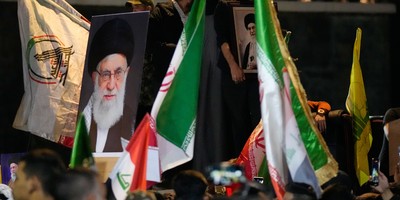In the summer of 2009, U.S. Marines pushed into Afghanistan's Helmand province to begin the new offensive that President Obama had ordered based on the model of the President Bush's Iraq strategy of nation-building and counter-insurgency (COIN). This fall, a little over five years later, U.S. Marines turned over their last base in Helmand to Afghan forces and, except for a residual force, left the country.
And?
Maybe a crescendo in background noise, but not much else. Surely, after 13 years of war, it's not too soon for a public reckoning. Then again, maybe it's too late. Maybe Americans have forgotten the fiasco of vision, strategy and tactics that civilian and military leaders forced onto the backs of U.S. service members. If so, it's worth returning to those early days of this war's final phase.
It started with that childish, lethal idea -- COIN. The U.S.-led International Security Assistance Force (ISAF) would fight to make the Islamic tribespeople of Afghanistan like us more than they liked the Islamic tribespeople of the Taliban. Then, according to COIN-plan, Western forces would transfer this fought-over affection of the Afghan people to the Kabul government that the West was simultaneously building and propping up. Presto -- COIN victory.
Grown men gushed at the prospect. "Victory in this conflict is about winning the hearts and minds of the Afghan people and engendering their trust," Air Force Brig. Gen. Steven L. Kwast said in 2009. "When the Afghan people trust us and believe us when we tell them what we're going to do, we will win this overnight."
COIN's fight for Afghan "hearts and minds" meant pandering was the order of the day. "I'm reading a very good book now about this part of the world. It's written in English, but it's all about you -- it's the Quran," the top commander in Afghanistan at the time, Gen. David D. McKiernan, told Afghan tribal leaders in April 2009.
Recommended
COIN also meant commanders ordered their troops into proximity and even intimacy with the local population -- the menfolk, anyway, pederasts, polygamists and misogynists by culture and religion, and, all too often, jihadists. "You're going to drink lots of tea. You're going to eat lots of goat. Get to know the people," Marine Brig. Gen. Lawrence D. Nicholson said, explaining this COIN order of battle to officers in July 2009. "That's the reason why we're here."
This was "population-centric COIN," as executed by President Obama's new ISAF commander, Gen. Stanley A. McChrystal. It is a doctrine that values (Afghan) population protection over (U.S.) force protection -- but don't worry, it's all for the good of the "long-term" cause. In the "short term," COIN commanders set highly restrictive "rules of engagement" to enforce the doctrine, undoubtedly leading to innumerable U.S. casualties. And how's that long-term cause doing?
On "60 Minutes" in October 2009, Marine Lt. Col. Christian Cabaniss explained how he got COIN concepts across to the fighting man.
"As I told the Marines before we deployed, it's about a three-second decision, especially with his personal weapon. The first second is 'Can I?' The next two are 'Should I?' 'What is going to be the effect of my action? Is it going to move the Afghan closer to the government or further away?'"
As even McChrystal would say about COIN in 2010, as reported in Rolling Stone: "This is the philosophical part that works with think tanks. But it doesn't get the same reception from infantry companies."
That's because infantry companies deal with bullets, not PowerPoint. "I understand the reason behind it, but it's so hard to fight a war like this," Lance Corporal Travis Anderson told The Associated Press in 2010. "They're using our rules of engagement against us," he said, adding that his platoon had repeatedly seen men dropping their guns into ditches before disappearing among civilians.
COIN was also very much about stuff -- "baksheesh," or bribes -- on a massive scale. "What do you need here?" The New York Times reported McChrystal asked locals for some two hours on a walk-through in a Helmand town in 2010. Schools. Security. Hospitals. Roads. "Inshallah, we will provide the services as soon as possible," Time reported the U.S. Joint Chiefs of Staff Chairman Adm. Mike Mullen saying in 2010, taking orders at a shura in Helmand.
But Afghans still didn't like us or trust us. Cultural chasm between Islam and the West, anyone? Nope, not enough COIN, U.S. commanders concluded. When Gen. David Petraeus became ISAF commander in 2010, he issued a fresh, new COIN guidance that included: "Walk. Stop by, don't drive by. Patrol on foot whenever possible and engage the population."
Foot patrols on IED-laced roads made COIN horrifically costly. In June 2011, the U.S. Army reported on a new pattern of injury -- "dismounted complex blast injury" -- and defined it thus: "An injury caused by an explosion occurring to a service member while dismounted in a combat theater that results in amputation of at least one lower extremity at the knee or above, with either amputation or severe injury to the opposite lower limb, combined with pelvic, abdominal or urogenital injury."
The final line may be most chilling of all: "This definition is not meant to define a subset of injuries for policy-making decisions." Heavens, no. Keep walking those IED-laced roads, for the love of not Mike, but Ahmed. Keep reality from all policy-making decisions, or COIN will self-destruct, along with the reputations of its enforcers.
Exactly why a public reckoning is essential.

























Join the conversation as a VIP Member